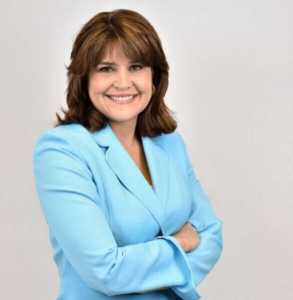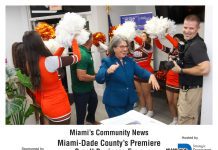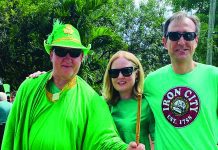|
Getting your Trinity Audio player ready...
|

“Socialist”, “communist,” “radical,” “the U.S. will fall into a dictatorship of “Jews and Blacks”. These are just a sampling of the politically-charged attacks often containing far-right conspiracy theories relating to ‘QAnon’ or other fringe ideologies designed to manipulate Latino voters. With a week to go in the most important election of our lifetimes, misinformation and disinformation are running rampant in South Florida. While elections in Miami are always subject to some trickery and negative attacks, this year we have seen disinformation efforts ramped up to an entirely new level.
Most South Floridians, including me, have had personal experience with disinformation campaigns in an effort to confuse voters. As a Latina Jew, but above all, as a human being, I find this unacceptable. I hope you join me in condemning this pro-Nazi and racist discourse that has no place in US political discourse. Regardless of party affiliation, everyone in our community should repudiate it. Earlier this year, I was listening to programming on a prominent Spanish-language radio station, Radio Caracol, when a speaker used anti-Semitic and racist language to spread false claims. When I raised the issue to the radio station, to their credit, they immediately took the segments off the air and apologized.
This was not the only instance where a Spanish radio spread false claims. One host of Actualidad Radio, Carinés A. Moncada, claimed that a co-founder of Black Lives Matter practiced “brujería” (witchcraft).
Unfortunately, this is just the tip of the iceberg. The New York Times reported recently on systemic false information and memes percolating through talk radio, print media, and the WhatsApp groups that many of us in Hispanic communities use to connect with friends and family. Some of these attacks have been traced back to foreign interference; others were untraceable.
Just a few weeks ago, El Nuevo Herald faced their own disinformation fiasco, when it was revealed that a paid supplement to the paper, LIBRE, had been running false, racist, offensive content for the last eight months. For example they claimed that American Jews support “thieves and arsonists” and equated Black Lives Matters protesters with Nazis. When the scandal came to light, El Nuevo Herald apologized and the paper’s managing editor resigned, but damage was already done.
This is where we can all play a role in confronting and combating false claims.
The first way we can fight dis/misinformation is by learning to be questioning consumers of information. Before you share a link to an outlandish claim about voting or an elected official, ask yourself: is the source that produced this credible? Has this been verified by trusted sources such as our local elections administrators or major media outlets? If it’s a political advertisement, like a mailer or a social media ad, always be sure to check the disclaimer or fine print to see who is paying for the ad.
If a source does appear to be peddling ‘fake news’ and conspiracy theories, check its accuracy at websites such as snopes.com. We can also make sure that our friends and family who shared it or who might have also been exposed to it are made aware of its false contents. “See something, say something”: Make sure to call out disinformation when you see it, and help raise awareness to local journalists in your media market. If the information is being shared on a social media platform, report the post so that platform can address the issue.
The second way to combat dis/misinformation is by sharing accurate information about how people in our community can vote. Our local Supervisors of Election are the best source of voting information. So if you have a question about how to make sure your vote by mail ballot is counted, when you can vote or where, don’t hesitate to reach out to your local elections administrators. You can also call the national voter protection hotline with questions or concerns at 1-866-OUR VOTE or 1-888 VE-Y-VOTA. This hotline is staffed by trained, non-partisan, legal experts who are ready to help.
Our right to vote is sacred in a democracy, and we all deserve to make our decisions at the ballot box guided by facts and real information—not lies that distort the truth in order to spread mistrust and fear in our communities. We are smarter than that and we will not be discouraged from exercising our right and our duty to vote.
We can’t afford to repeat the mistakes of the past. Let’s start winning the war on disinformation by tackling these problems at the root, and making sure our own friends and family cast their votes based on the facts, not falsehoods and propaganda.
Annette Taddeo is a State Senator representing District 40 in South Florida.






Comments are closed.